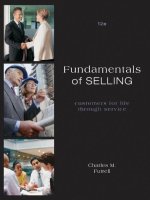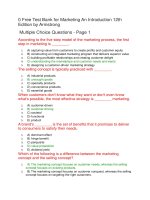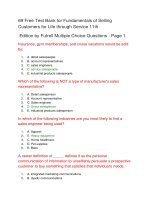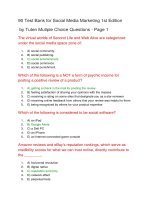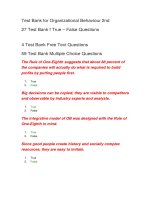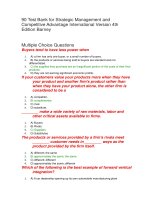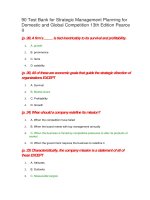90 test bank for fundamentals of selling customers for life through service 12th edition
Bạn đang xem bản rút gọn của tài liệu. Xem và tải ngay bản đầy đủ của tài liệu tại đây (123.62 KB, 26 trang )
90 Test Bank for Fundamentals of Selling Customers
for Life through Service 12th Edition
Mutiple Choice Questions - Page 1
In which of the following industries are you most likely to find a sales
engineer being used?
1.
A. Apparel
2.
B. Heavy equipment
3.
C. Home healthcare
4.
D. Pet supplies
5.
E. Industrial products
The _____ refers to the sales philosophy of unselfishly treating others as
you would like to be treated.
1.
A. Golden Rule of Personal Selling
2.
B. reciprocity principle
3.
C. 80/20 principle of sales
4.
D. ABCS principle of sales
5.
E. equity theory of sales
A(n) _____ concentrates on performing promotional activities and
introducing new products rather than directly soliciting orders.
1.
A. sales engineer
2.
B. account representative
3.
C. detail salesperson
4.
D. retail salesperson
5.
E. service salesperson
Billy Marshall sells blank aluminum cans for soda manufacturers to fill.
Billy would be best classified as a(n):
1.
A. detail salesperson.
2.
B. account representative.
3.
C. sales engineer.
4.
D. direct salesperson.
5.
E. industrial products salesperson.
Robert Clarence is a(n) _____ for a manufacturer of restaurant-grade
appliances. He does not directly solicit orders. His primary duties involve
promotional activities such as introducing and demonstrating new
products at trade shows.
1.
A. retail salesperson
2.
B. detail salesperson
3.
C. sales engineer
4.
D. service salesperson
5.
E. account representative
The person behind the counter at McDonald's who enters your order,
takes your money, and hands you your food is a(n):
1.
A. retail salesperson.
2.
B. sales executive.
3.
C. order-getter.
4.
D. direct salesperson.
5.
E. account representative.
Surveys have found that salespeople are rated low on ethics and honesty.
What is the number one reason for these low ratings?
1.
A. Many feel that the products are priced high.
2.
B. Many feel that they may not be able to trust a salesperson.
3.
C. People perceive that most products are of low quality.
4.
D. Salespeople cannot evoke impulsive buying through sales calls.
5.
E. The sales force is devoid of qualified and trained personnel.
A new and more appropriate definition of personal selling:
1.
A. relates it more closely to transactional marketing.
2.
B. identifies electronic selling as the most effective channel.
3.
C. stresses the importance of being unselfish.
4.
D. excludes telemarketing activities.
5.
E. substitutes the word "relationship marketing" for "personal selling."
Anderson is a used cars salesperson and he believes in the Golden Rule
of Personal Selling. He would feel that:
1.
A. profit maximization is the ultimate goal of business.
2.
B. an action is acceptable if it is legally correct.
3.
C. salespeople should be driven by pride and achievement orientation.
4.
D. results are attributed to the personal efforts of individuals.
5.
E. the results that he obtained are to be attributed to others.
A salesperson who adheres to the Golden Rule of Personal Selling:
1.
A. is primarily motivated by money.
2.
B. is driven by pride.
3.
C. does what they think they can get away with.
4.
D. finds others' interests most important.
5.
E. requires intensive monitoring.
An account representative:
1.
A.concentrates on performing promotional activities and introducing new products
rather than directly soliciting orders.
2.
B. sells products that call for technical know-how and an ability to discuss
technical aspects of the product.
3.
C. sells tangible, highly complex products to industrial buyers.
4.
D. calls on a large number of already established customers and asks for the
orders.
5.
E. must sell the benefits of intangible or nonphysical products such as financial
services.
Which of the following is one of the reasons why people choose sales
jobs?
1.
A. A salesperson faces less pressure compared to most other jobs.
2.
B. A sales job provides high relative freedom of any career.
3.
C. Accountability is limited for a person doing sales job.
4.
D. A salesperson needs lesser skills than people doing other jobs.
5.
E. Sales jobs' fixed salary is higher compared to most other jobs.
The person who telephoned James last night to ask him if he was
interested in adding HBO and Cinemax to his current television cable
system would be classified as a(n):
1.
A. relationship seller.
2.
B. retail salesperson.
3.
C. order-taker.
4.
D. account representative.
5.
E. sales engineer.
Peter sells electrical supplies to retailers and home builders. Peter's
organization buys the electrical supplies from various manufacturers.
Peter can be best classified as a(n) _________.
1.
A. retail salesperson
2.
B. detail salesperson
3.
C. accounts representative
4.
D. wholesale salesperson
5.
E. sales engineer
In a large firm like Hewlett-Packard or General Electric, a salesperson's
career path usually begins at the level of:
1.
A. technical support person.
2.
B. sales representative.
3.
C. sales trainee.
4.
D. key account salesperson.
5.
E. assistant manager.
Order-takers:
1.
A. use creative sales strategies.
2.
B. face more difficult selling situations than order-getters.
3.
C. usually earn much more than order-getters.
4.
D. are hired to bring in additional business.
5.
E. rely on well-executed sales presentations.
Which of the following is the logical order of salespeople based upon
decreasing self-interest?
1.
A. Golden Rule, traditional, professional
2.
B. traditional, Golden Rule, professional
3.
C. professional, traditional, Golden Rule
4.
D. Golden Rule, professional, traditional
5.
E. traditional, professional, Golden Rule
Laura sells drawer pulls, hinges, and other decorative metal pieces used
in the manufacture of furniture. Since the products that she sells to the
furniture makers are nontechnical in nature, Laura could be best
described as a(n):
1.
A. account representative.
2.
B. detail salesperson.
3.
C. sales engineer.
4.
D. order-taker.
5.
E. industrial products salesperson.
Professional salespeople:
1.
A. are not driven by pride and ego.
2.
B. believe service is more important than money.
3.
C. enjoy recognition and share if it suits their purpose.
4.
D. feel that an individual's performance is due to others.
5.
E. do what they think they can get away with.
Which of the following positions appears lower than other positions in the
upward sequence of job movements during a sales career?
1.
A. District sales manager
2.
B. Key account salesperson
3.
C. Regional sales manager
4.
D. Area sales manager
5.
E. Divisional sales supervisor
_____ sell face-to-face to consumers, typically in their homes, who use the
products for their personal use.
1.
A. Detail salespeople
2.
B. Sales engineers
3.
C. Direct sellers
4.
D. Account representatives
5.
E. Wholesale salespeople
____ refers to making a contribution to the welfare of others.
1.
A. Sales
2.
B. Relationship
3.
C. Association
4.
D. Service
5.
E. Exchange
In addition to performance, the salary earned by a sales manager is
closely related to the:
1.
A. annual sales volume of the industry the firm is in.
2.
B. salary earned by his subordinates.
3.
C. the number of products lines the firm has.
4.
D. annual sales volume of his/her firm.
5.
E. number of years he/she has spent in the company.
The Golden Rule of personal selling refers to the sales philosophy of:
1.
A. unselfishly treating others as you would like to be treated.
2.
B. giving more importance to sales maximization than profit maximization.
3.
C. making sales mutually beneficial to the buyer and seller.
4.
D. obtaining a financial benefit by helping others.
5.
E. realizing a major part of the profit from only a few customers.
_____ is traditionally defined as the personal communication of
information to persuade a prospective customer to buy something which
satisfies that individual's needs.
1.
A. Marketing
2.
B. Personal selling
3.
C. Public relations
4.
D. Advertising
5.
E. Promotion
A sales engineer:
1.
A. services the retail products sold to customers.
2.
B. services the industrial products sold to institutions.
3.
C. sells products directly to consumers.
4.
D. is also known as an order-taker.
5.
E. sells products that call for technical know-how.
Kevin contacted his local phone company yesterday and talked to the
receptionist about whether or not it is possible to have an Internet
connection without having local phone service. The receptionist is likely
to have put him in touch with a(n):
1.
A. detail salesperson.
2.
B. retail salesperson.
3.
C. order-taker.
4.
D. account representative.
5.
E. sales engineer.
Which of the following statements about order-getters is true?
1.
A. They often face the most powerful resistance.
2.
B. They do not solicit orders from customers directly.
3.
C. They do not use sales presentations when calling on prospects.
4.
D. They often do not have a clear sales strategy.
5.
E. They wait for customers' orders.
55 Free Test Bank for Fundamentals of Selling
Customers for Life through Service 12th Edition by
Futrell Mutiple Choice Questions - Page 2
Arthur is the sales representative of a pharmaceutical company. He is
liked by his clients and he likes them. He is never critical and
unsympathetic of his customers. Here Arthur is displaying _____ skills.
1.
A. networking
2.
B. operational
3.
C. technical
4.
D. human
5.
E. conceptual
During the _____ step of the selling process, salespeople would locate
potential buyers.
1.
A. prospecting
2.
B. preapproach
3.
C. approach
4.
D. presentation
5.
E. selection
The "heart" of the eight work characteristics for sales success is:
1.
A. sales knowledge.
2.
B. cultural sensitivity.
3.
C. love of selling.
4.
D. communication ability.
5.
E. stamina for the job.
Which of the following is NOT one of the four main elements in the
customer relationship process used by salespeople to build long-term
relationships?
1.
A. Service
2.
B. Competitor analysis
3.
C. Gaining commitment
4.
D. Needs analysis
5.
E. Presentation of product benefits
Which of the following is NOT part of the acronym SSUCCESS?
1.
A. Use of the Golden Rule
2.
B. Staminaforthejob
3.
C. Personal characteristics
4.
D. Strategic thinking
5.
E. Cultural sensitivity
When Emerson performs the functions of planning, organizing, and
executing activities that increase sales and profits in his district, he is
performing the duties associated with:
1.
A. operations management.
2.
B. organizational accounting.
3.
C. district marketing.
4.
D. territory management.
5.
E. accounts management.
People like to buy, not be sold; and they like to buy from people they
know and trust. This shows the importance of using:
1.
A. the Golden Rule of Selling.
2.
B. traditional methods of selling.
3.
C. a transactional approach to sales.
4.
D. the trial close ahead of close.
5.
E. an alternative sales close.
Since it is essential to build a long-term relationship with buyers, the
salesperson's job is to:
1.
A. persuade the customer to perform the desired action without much delay.
2.
B. coerce the customer to make a decision in favor of the company as early as
possible.
3.
C. present necessary information for the buyer to make an educated decision.
4.
D. influence the customer-decision making process by manipulating available
information.
5.
E. make sales presentations that are favorable to the company.
_____ is the final step in the selling process.
1.
A. Presentation
2.
B. Meeting objections
3.
C. Sale closing
4.
D. Follow-up and service
5.
E. Sales delivery
Usually, the first sales management position to which a salesperson is
promoted is:
1.
A. senior salesperson.
2.
B. key sales manager.
3.
C. regional sales manager.
4.
D. divisional sales manager.
5.
E. district sales manager.
A senior salesperson regularly contacts the larger, more important
customers. This function is referred to as a(n) _____ sales position.
1.
A. technical
2.
B. imagery
3.
C. key account
4.
D. composite
5.
E. alternate
The basic competencies of selling to be possessed by professional
salespeople include selling skills and _________.
1.
A. accounting knowledge
2.
B. product knowledge
3.
C. an outgoing personality
4.
D. a college degree
5.
E. computer knowledge
Which of the following statements about a salesperson's duties as a
territory manager is true?
1.
2.
A. The success of a salesperson is wholly dependent on his/her product
knowledge.
B. Salespeople are not expected to manage items such as damaged goods.
3.
C. Salespeople provide various solutions to customers' problems.
4.
D. A salesperson producing a sufficient number of new accounts each period is
not expected to increase sales in his/her existing accounts.
5.
E. A salesperson's responsibility ends when a product is sold to the customer and
the service person's responsibilities begin.
Which of the following is the best example of a nonfinancial reward?
1.
A. The feeling of self-worth
2.
B. Vacation packages offered to salespeople
3.
C. Employee stock option
4.
D. Variable sales incentive
5.
E. Tax benefit
_____ skills refer to the seller's understanding and proficiency in the
performance of specific tasks.
1.
A. Conceptual
2.
B. Operational
3.
C. Automated
4.
D. Transactional
5.
E. Technical
The acronym SUCCESS is used in selling to help you remember the eight:
1.
A. most frequently listed characteristics needed to be successful in sales.
2.
B. steps required to create a customer profile.
3.
C. mental stages through which customers pass as they decide to buy.
4.
D. types of knowledge a salesperson needs to succeed.
5.
E. steps to creating an effective sales presentation.
_____ skill is the cognitive ability to see the selling process as a whole
and the relationship among its parts.
1.
A. Human
2.
B. Observational
3.
C. Conceptual
4.
D. Technical
5.
E. Developmental
Which of the following can be considered as an example of technical
skills?
1.
A. Analytical ability
2.
B. Strategic thinking
3.
C. Interpersonal ability
4.
D. Planning ability
5.
E. Ability to work with other people
_____ is the most difficult trait for a salesperson to develop and it
concerns one's emotions, passions, and desires.
1.
A. Personalization
2.
B. Conceptual orientation
3.
C. Internalization
4.
D. Self-control
5.
E. Technical orientation
The _____ refers to the salesperson's sequential series of actions that
leads toward the customer taking a desired action and ends with a followup to ensure purchase satisfaction.
1.
A. sales process
2.
B. prospecting cycle
3.
C. sales design
4.
D. selling order
5.
E. sales schedule
The three categories of skills needed by the successful salesperson can
be summarized as:
1.
A. conceptual, human, and technical skills.
2.
B. personal, mental, and spiritual skills.
3.
C. communication, relationship-building, and empathy skills.
4.
D. sales features, advantages, and benefits.
5.
E. order-getting, order-taking, and service-providing skills.
As the manager of a territory, the salesperson:
1.
A. is required to continually engage in new product development.
2.
B. concentrates more on new customers than handling existing customers.
3.
C. performs selling activities and avoids nonselling activities.
4.
D. provides his/her company with market information.
5.
E. sells products to customers rather than help educate them on the use of the
products.
In terms of the selling process, what is the next step once a salesperson
has satisfactorily answered an objection voiced by his/her prospect?
1.
A. Follow-up
2.
B. Approach
3.
C. Trial close
4.
D. Presentation
5.
E. Close
Wiley Sebastian is a new salesperson. Which of the following is expected
of him as a part of providing service to his customers?
1.
A. Develop new products
2.
B. Perform all sales activities without any assistance
3.
C. Involve only in prospecting and cold-calling
4.
D. Create technical research analyses reports
5.
E. Work at the customer's business when required
Which of the following statements about sales success is true?
1.
A. For success in sales, it is more important to speak well than to listen well.
2.
B. Today's salespeople make contributions to the welfare of others through
service.
3.
C. Operational orientation is more important to salespeople than strategic
orientation.
4.
D. Successful salespeople are focused on closing than the other aspects of sales.
5.
E. Physical attributes such as stamina are not requisite for sales success.
Which of the following statements on customer-oriented selling is true?
1.
2.
A. Finding new customers is more important than selling to repeat customers.
B. Loyal customers listen to the seller but pay high attention to the seller's
competition also.
3.
C. It will not be possible for a seller to know his customers' business.
4.
D. Technology plays only a small role in modern selling.
5.
E. The key to customer retention is customer satisfaction.
The skills a salesperson needs to perform his/her job can be categorized
into three areas. According to the text, which of the following is an
example of a conceptual skill?
1.
A. Mastery of selling techniques
2.
B. Planning ability
3.
C. Ability to be sympathetic
4.
D. Interpersonal skills
5.
E. Ability to work with other people
True - False Questions
Salespeople should be self-directed, aggressive, and persuasive to be
successful.
1.
True
2.
False
Selling is a separate discipline rather than a component of marketing.
1.
True
2.
False
Acts such as obtaining interviews, determining sales call objectives, and
designing sales presentation strategies are collectively referred to as
prospecting.
1.
True
2.
False
Jobs such as inside retail sales and outside delivery are performed by
order-getters.
1.
True
2.
False
A service salesperson must sell the benefits of intangible products such
as financial, advertising, or computer repair services.
1.
True
2.
False
As interest in serving others improves, a person's self-interest lessens.
1.
True
2.
False
Self-control concerns a person's intelligence and discipline rather than
his/her emotions, passions, or desires.
1.
True
2.
False
A detail salesperson concentrates on directly soliciting orders.
1.
True
2.
False
A retail salesperson sells goods or services to consumers for personal
and business use.
1.
True
2.
False
An outside salesperson operates with less direct supervision compared to
other employees in an organization.
1.
True
2.
False
Golden rule salespeople attribute results to others and believe that money
is to be shared.
1.
True
2.
False
A wholesale salesperson is one who sells products to parties for resale,
for use in producing other goods or services, and for operating an
organization.
1.
True
2.
False
As manager of a territory, a salesperson provides service to customers
and helps them resell the products.
1.
True
2.
False
Salespeople need not increase sales in old accounts if they are generating
a sufficient quantity of new customers.
1.
True
2.
False
Imposing strict limitations on themselves is important to be successful as
salespeople.
1.
True
2.
False
Professional salespeople attribute results to external elements such as to
employer, customers, and economy.
1.
True
2.
False
Because sales jobs offer higher nonfinancial rewards than most other
areas of corporate America, the compensation of salespeople is typically
lower than that of workers in areas like production who are at a
comparable level in the organization.
1.
True
2.
False
Customer contact person is another name for a salesperson.
1.
True
2.
False
A person is involved in selling when he/she wants someone to do
something.
1.
True
2.
False
Nonfinancial rewards given by the company are referred to as incentives.
1.
True
2.
False
Conceptual skills are especially important for the creative order-getters
than the other sellers.
1.
True
2.
False
For the last two decades, Gallup has found that used car salespeople were
rated higher on perceived honesty and ethical standards than other
salespeople.
1.
True
2.
False
Practice alone is enough to learn how to sell.
1.
True
2.
False
Top salespeople speak the other person's language, both in verbal and
nonverbal communication.
1.
True
2.
False
Salespeople should not provide information to their companies or
customers on such topics as competitors' activities.
1.
True
2.
False
A divisional sales manager is ranked higher than a regional sales manager
in the upward sequence of job movements during a sales career.
1.
True
2.
False
Conceptual skill is a cognitive ability to see the selling process as a whole
and the relationship among its parts.
1.
True
2.
False
Direct sellers sell face-to-face to consumers who use the products for
their personal use.
1.
True
2.
False
Trial close refers to asking prospect's opinion after overcoming each
objection and immediately before the close.
1.
True
2.
False
The sales process refers to the salesperson's sequential series of actions
and ends with the customer taking a desired action such as buying the
product.
1.
True
2.
False
The salesperson's job is to present the necessary information for the
buyer to make an educated decision though they are under pressure to
sell.
1.
True
2.
False
The first managerial level usually given to the salespeople is the district
sales manager's position.
1.
True
2.
False
Order-getters ask what the customers want or wait for customers to order.
1.
True
2.
False
Many companies recognize the value of keeping some salespeople in the
field for their entire sales career.
1.
True
2.
False
Personal selling refers to the personal communication of information to
unselfishly persuade a prospective customer to buy something that
satisfies that individual's needs.
1.
True
2.
False
Free Text Questions
List the six major reasons for choosing a sales career.
Answer Given
The six major reasons for choosing a sales career are: • The wide variety of sales
jobs available; • The freedom of being on your own; • The challenge of selling; •
The opportunity for advancement in a company; • The rewards from a sales
career; • The opportunity to provide service to others.
Briefly describe the main types of manufacturer sales positions.
Answer Given
There are five main types of manufacturer sales positions: • An account
representative calls on a large number of already established customers. This
person asks for the order; • A detail salesperson concentrates on performing
promotional activities and introducing new products rather than directly soliciting
orders; • A sales engineer sells products that call for technical know-how and an
ability to discuss technical aspects of the product. Expertise in identifying,
analyzing and solving customer's problems is another critical factor; • An industrial
products salesperson, nontechnical, sells a tangible product to industrial buyers.
No high degree of technical knowledge is required; • A service salesperson, unlike
the four preceding types of manufacturing salespeople, must sell the benefits of
intangible products such as financial, advertising, or computer repair services.
What are the two types of rewards that salespeople can earn? Give an
example of each.
Answer Given
The two types of rewards that salespeople can earn are financial and nonfinancial.
Nonfinancial rewards are sometimes called psychological income or intrinsic
rewards. They are generated by the individual and not given by the company. An
example of a nonfinancial reward is a feeling of self- worth. Many are attracted to
selling because in a sales career financial rewards are commonly based solely on
performance. Salaries and sales commissions are examples of financial rewards.
List and briefly explain three important categories of skills that are
necessary for a salesperson's success.
Answer Given
The necessary skills that are necessary for a salesperson's success can be
summarized in three categories that are especially important: conceptual, human,
and technical. Conceptual skill: It is the cognitive ability to see the selling process
as a whole and the relationship among its parts. It involves the seller's thinking
and planning abilities. This skill is especially important for order-getters. Human
skill: It is the seller's ability to work with and through other people. Salespeople
demonstrate this skill in the way they relate to other people. A seller with human
skills likes other people and is liked by others. Technical skill: It is the
understanding and proficiency in the performance of specific tasks. It includes
mastery of the methods, techniques, and equipment involved in selling such as
presentation skills and uses for one's products. It includes specialized knowledge,
analytical ability, and the competent use of tools and techniques to solve problems
in that specific domain.
List the four main elements in the customer relationship process.
Answer Given
The four main elements in the customer relationship process used by salespeople
to build long-term relationships are: • Analyze customer needs; • Present product
benefits; • Gain commitment for the purchase; • Provide excellent service in order
to maintain and grow the relationship.
How do salespeople impact society?
Answer Given
Salespeople generate more revenue in the U.S. economy than workers in any
other profession. Salespeople impact society in such diverse areas as: • The
success of new products; • Keeping existing products on the retailer's shelf; •
Constructing manufacturing facilities; • Opening businesses and keeping them
open; • Generating sales orders that result in the loading of trucks, trains, and
other means of transport that carry goods to customers all over the world.
What does the acronym SSUCCESS signify? Explain briefly.
Answer Given
The acronym SSUCCESS signifies the eight most frequently mentioned
characteristics necessary to be successful in sales. It refers to: • Service to others;
• Use of the Golden Rule; • Communication ability; • Personal characteristics; •
Excellence at strategic thinking; • Sales knowledge; • Stamina for the job; • Love of
selling at the heart of all the above.
What is the traditional definition for personal selling? How does the
traditional definition differ from the new one in the text?
Answer Given
The new definition of personal selling inserts the word "unselfish" into the
traditional definition. According to the new definition, personal selling refers to the
personal communication of information to unselfishly persuade a prospective
